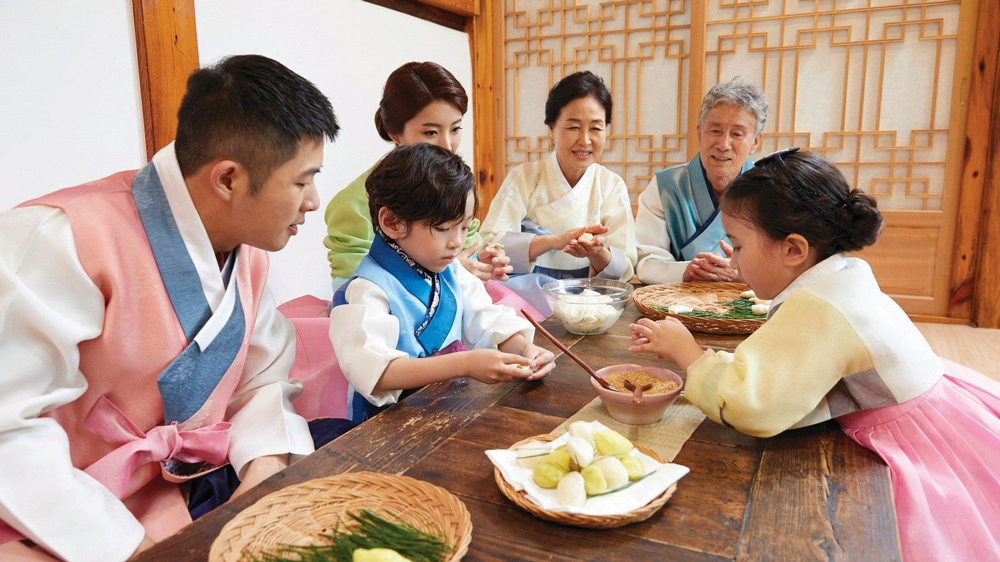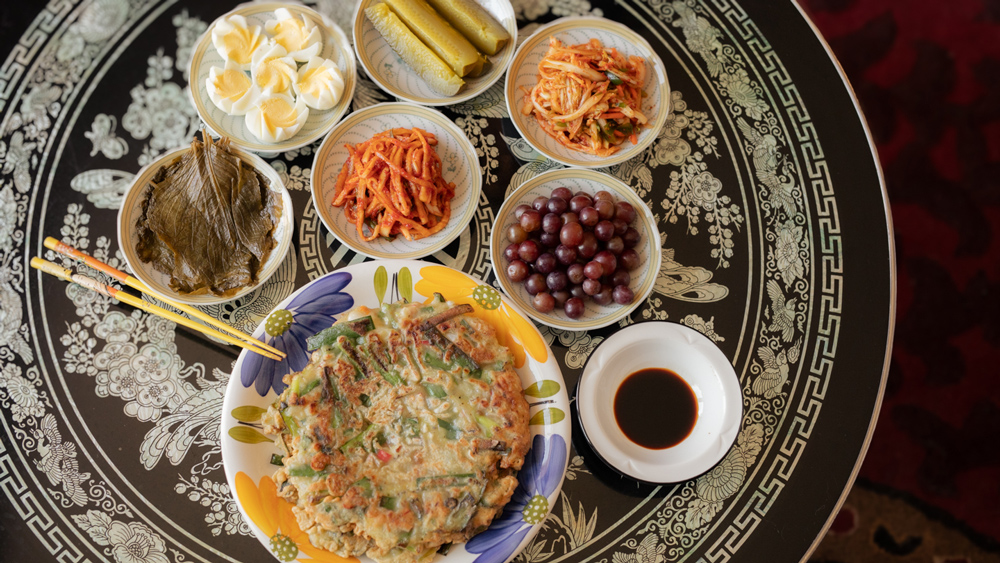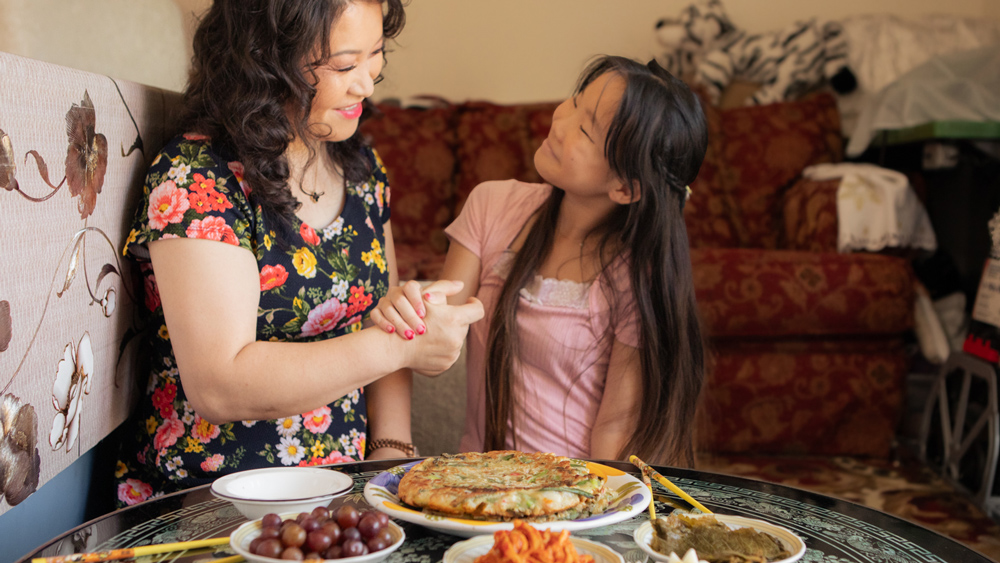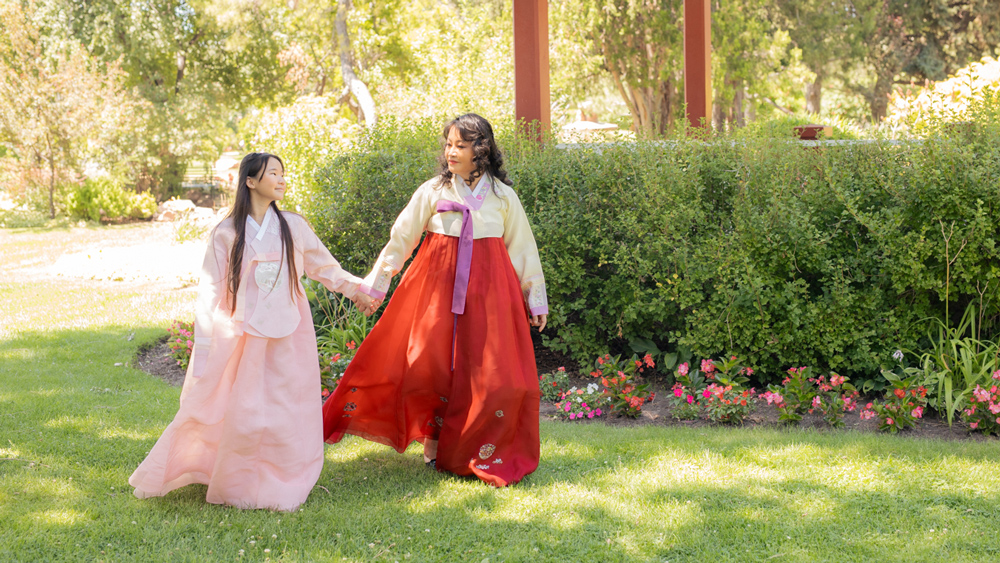New Beginnings: A Conversation with Hae Jung & Sue

Hae Jung is very familiar with loss and grief: Her mother passed away when she was a teenager, after she grew up and got married, her husband died, and three years after that, her father starved to death. Life became unbearably difficult for Hae Jung after the death of her father. With no family left and no resources to survive on, she escaped to China in search of a better life.
Hae Jung was arrested twice during her 14 years in China, but was able to evade repatriation on both occasions. Still, she lived with constant anxiety that she would be caught and sent back, and her Chinese-born daughter, Sue, grew up fearing for her mother’s life.
Seeing the devastating effects that living in hiding had on her daughter, she escaped with Sue to South Korea. Together, they made it safely through LiNK’s networks, a journey which was funded by UT Austin's Rescue Team, just before Sue’s 8th birthday.
Now safely resettled in South Korea, Sue is attending school and Hae Jung is working as a salesperson at a mobile phone company. Hae Jung also volunteers at a local welfare center to aid people with disabilities by cooking for them and cleaning their houses and helps out at her daughter’s school as a crossing guard with other parents.
Our resettlement coordinators, Jihyun and Anna, recently met up with Hae Jung and Sue to see how they’ve been doing.

While cutting up some fruit to serve, Hae Jung began to talk about what it's been like to live in freedom...
Hae Jung: Even nowadays, more than two years after I resettled in South Korea, I still pinch myself to see if this is real—that I’m free, that I live in South Korea. Although there are difficulties here, too, especially for people like me who still don’t know a lot about this society, I always try to think that I can overcome those difficulties. If I already think it is impossible to overcome, I can never overcome anything.

Jihyun: What advice would you give to a friend who just arrived in ROK?
Hae Jung: Try to learn as much technology as possible to facilitate your adjustment to this society (especially knowing how to use computers and the Internet is so necessary). You have to experience new things on your own instead of only listening to other people’s experiences. And, go to college if you are young enough.
No matter where you go, you will always face difficulties, conflicts with other people due to different cultures and customs. Some people will look down on you and you will make mistakes because you are not used to this society. Although South Koreans don’t have to adjust to this society the way resettled North Koreans do, they also deal with similar things in life. We are not that different. Try to find people you can open your heart to, share your struggles with, and laugh about the struggles with them.
Don’t be afraid of difficult things or interpersonal conflicts. Try to remember what you went through in North Korea, where you were not treated as human beings, then it will give you different perspectives on how to approach difficulties you may have.

Jihyun gave Sue a wooden pen, which she was very excited to receive, with the UT Austin crest carved into it. The pen is a gift from Julian, a former member of the UT Austin Rescue Team who now interns at LiNK HQ. Hae Jung and Sue have met Julian twice in South Korea.

Jihyun showed Hae Jung and Sue a video of Julian saying hi and telling them about what he’s doing at LiNK HQ as an intern. Hae Jung was so happy to see Julian that she actually waved and said "Hi!” twice while watching it.

Jihyun to Sue: How do you like school these days?
Sue: It’s alway fun!
Jihyun: What is your favorite subject?
Sue: “Math”

Jihyun to Sue: What are you thankful for this year?
Sue: What do you mean?
Jihyun: Well, for example, you could be thankful because you had a summer break this year, haha. You also saw Julian from the UT Austin Rescue Team again and you got to study with your tutor through our ETCE Program earlier this year. And...ah, your fractured wrist healed well and fast, too! So is there anything you are particularly thankful for, which happened this year?
Sue: “Aren’t we thankful for just the fact that we have life?”

Jihyun to Hae Jung: How do you and Sue spend time together?
Hae Jung: I try to spend as much time as possible with my daughter. We often go to the park in our apartment complex to have mom and daughter time by walking and exercising together. Sometimes we do karaoke, too. When I went to karaoke with my daughter for the first time, I was surprised to see her sing and dance to a lot of South Korean pop songs. I was like, ‘when did you learn all that?’. I realized that kids adjust faster than adults. You know, she already has a South Korean accent.

Jihyun: What kind of difficulties did you face in North Korea?
Hae Jung: Things were so difficult during the famine in the 90s, especially after the public distribution system collapsed in 1994. One time, after starving for so many days, my father and I started moving around to different towns with salt and matches to find tree roots and bark. Whenever we found tree roots and bark, we cooked them with salt and ate them. We had to do that to survive until wild, edible greens started growing in June, so we could eat the greens instead of tree roots and bark. In July and August, I got to save some greens so I could sell them at the illegal marketplaces. However, sometimes my greens even got taken away by the police whenever they cracked down on the illegal marketplaces.
Very sadly, during the famine, I lost many of my family members. I still remember the very moment when I saw my father dying of starvation while crying for corn soup and tofu that he really wanted to eat. I was also very close to starving to death. I weighed as little as 55 pounds, which was not even a half of my normal weight of 119 pounds. If my friend hadn’t brought me some kernels, I would’ve died of starvation like my father.
In order to survive during the terrible famine, the people, including myself, started eating mice, but they were so hard to catch. You might think it sounds so gross, but when you are starving for so long, your mind gets so focused on finding anything edible—and how you can skin and cook them. Whenever I caught a mouse and cooked it, it smelled strong so people living on the same block noticed the smell and could tell someone near them was cooking mouse meat. Starving kids near my house were crying because they smelled it. I tried to share the meat with those kids as much as possible, but sometimes I couldn’t because I was starving, too, and didn’t have enough to share.
Jihyun: What are some difficulties you’ve faced since resettling?
Hae Jung: When I first came to South Korea, I had a hard time understanding expressions and words that South Koreans use. Because of that, I had difficulty communicating with people at work when I was working as a caretaker and waitress.

Jihyun: What is it like living in freedom in South Korea?
Hae Jung: It is very convenient thanks to more technology. Before I left North Korea in the late 90s, in my town there was only one TV in every five households and the TV had only one channel. Now in South Korea, however, every house has at least one TV and it has so many different channels. Also, almost every household has a computer and uses the Internet.
I think the Internet makes my life so much easier. If I want to listen to my favorite songs or look up information, I just have to move my fingers.
I feel so much freedom in many parts of my life. I love that people don’t bother you as long as you don’t bother them or break the law. I also think that the freedom makes people not only more equal to one another but also more friendly to each other.
I love being able to learn new things here.
When I got my ID, after coming to South Korea, I was happy. I felt like I had become a human being again (because I lived illegally in China for so long, always hiding and being afraid of getting caught). When I was in North Korea and China, I felt like I was an animal like a dog or a pig. Since I live as a human being here with freedom, I am proud of myself and even compliment myself for living like a human, which I longed for in North Korea and China.
Freedom also enables me to be healthy since I don’t have to do a lot of physically hard labor that a lot of people still do in North Korea these days due to lack of technology and infrastructure.

Jihyun: What hopes do you have for Sue?
Hae Jung: Of course, like any other mom in the world, I want her to be successful in life. I hope she will go to a good university, study overseas, get a good job, and prosper in many ways. I know that is just my wish. It is out of my control and it depends on how much she tries/her effort.
The most important thing for me is that Sue will grow well—healthy and happy. I want to be there for my daughter whenever she needs me. I want to be positive to her all the time so I can be a good role model and influence her to also take on a positive outlook on life.
Also I want to continue telling her to appreciate what she has and to care for others who are underprivileged and have disabilities. I want her to know that we have to give back to the society because we’ve received so much from people like LiNK’s staff and supporters.
You can help more North Korean refugees escape China and resettle in a safe country here.
Chuseok for North Koreans | No Way Home for the Holidays
Autumn is a significant season for many people and cultures around the world. It’s a period of transition and reflection, gratitude for the days gone by, and celebration of the harvest.
In both North and South Korea, this time of year is celebrated with Chuseok, or the mid-autumn festival. Also known as “Korean Thanksgiving,” it’s a major holiday that predates the division of the peninsula. Chuseok is observed on the 15th day of the 8th month of the lunar calendar, when the harvest moon shines brightest. Traditionally, people return to their ancestral hometowns to gather with family, share a variety of delicious foods, and pay respects to their ancestors.
But for North Korean refugees, there is no going back. Holidays like Chuseok can be a bittersweet time, one of both gratitude for a life in freedom and grief over being unable to celebrate with family still inside North Korea.
“The first Chuseok in the US felt very empty and lonely. It was just me and my two-year-old daughter, Mia, back then. It didn’t feel like a holiday. I had multiple emotions at the same time. Loneliness, emptiness… there were so many feelings that I couldn’t even put into words.“
– Holly, escaped North Korea in 2013
Chuseok celebrations have evolved to look a little different in North versus South Korea, and even in countries like the US where the Korean diaspora have resettled.

Chuseok Traditions in South Korea
In South Korea, Chuseok is considered the largest and most important holiday of the year. It’s celebrated over three days, during which a “national migration” takes place as people all over the country travel to their hometowns or to go sightseeing. Tickets for planes, trains, and buses are sold out months in advance, and freeways are packed with bumper-to-bumper traffic during the holiday period.
On the morning of Chuseok, families hold a memorial service for their ancestors at home, known as charye (차례). A table of food is prepared as an offering, typically featuring rice cakes, fresh fruits and vegetables, meat dishes, and the favorite meals of deceased loved ones. Families will also visit ancestral gravesites, a custom known as seongmyo (성묘), to pay their respects and tend to the graves.

From the ancestral table to large family meals, food is a central part of Chuseok celebrations. The defining dish of this holiday is seongpyeon (송편), a chewy, sweet, and nutty half-moon shaped rice cake steamed in fresh pine needles. It’s traditionally made with rice from the year’s harvest, finely milled into flour. Preparing seongpyon becomes a family activity as each piece is shaped by hand and filled with red bean paste, toasted sesame seeds, or chestnuts.
Other holiday foods include pajeon(파전), a crispy, savory pancake made with green onions; galbijjim (갈비찜), sweet and savory braised short ribs; and japchae(잡채), glass noodles stir-fried with meat and vegetables.

How Chuseok is Celebrated in North Korea
In North Korea, Chuseok is just a one-day celebration. While it is considered a key traditional holiday, its importance has been minimized relative to national holidays like the birthdays of Kim Il-sung and Kim Jong-il, and the anniversary of the founding of the Worker’s Party.
On both traditional and national holidays, North Koreans are urged to visit the statues of Kim family leaders or the Kumsan Palace of the Sun in Pyongyang, where the bodies of Kim Il-sung and Kim Jong-il lie.
It is much less common for widespread travel to take place during Chuseok due to severe travel restrictions and poor transportation infrastructure. However, these constraints have also made it so that generations of North Koreans remain in close proximity to their hometowns and relatives. For Chuseok, people gather with their nearby family members. Just like in South Korea, they’ll prepare special foods as offerings for charye, and then visit ancestral grave sites to pay respects.
After ancestral rites, festivities become a community affair with traditional food and folk games shared amongst family, friends, and neighbors. Songpyeon is also a holiday staple, but the North Korean version is made with a minced meat and vegetable filling, and are twice as big as South Korean ones. Common folk games are yutnori (윷놀이), a board game, and ssireum (씨름), or Korean wrestling.
Holly & Mia: A Legacy of Freedom
It’s been over a decade since Holly left her hometown in North Korea. But whenever she makes pajeon (파전), it takes her right back to her childhood—sitting by the frying pan and watching her mom cook, eagerly awaiting a taste. “Pa”(파) means green onion and “jeon”(전) refers to foods that have been pan-fried or battered. There are many varieties of “jeon,” made with everything from potatoes to zucchini, seafood, kimchi, and more.
Holly saw her mom cook this dish countless times in North Korea. It was an inexpensive, everyday staple, but also an essential part of the holidays. Every year for Chuseok, the mouthwatering aroma of oil and batter would draw everyone to the kitchen, where a colorful assortment of jeon was being prepared.
Holly now lives halfway across the world from North Korea, but every year during Chuseok, she sets out an offering table for charye. For hours, she prepares foods like pajeon with great care, remembering and honoring her parents and loved ones, who she can’t be with for the holidays.

In 2016, Holly reached freedom through LiNK’s rescue networks with one-year-old Mia in her arms.
Mia is now at an age where she’s able to understand some of the things her mother went through. Holly has begun to open up more about her life in North Korea, and does her best to keep their small family connected to their Korean heritage. She takes Mia to Korean language school on Sundays, and makes an effort to celebrate cultural holidays, like Chuseok. What can’t be put into words, Holly communicates through food—their dinner table is always full of delicious Korean cooking.
In 2024, Holly received her US citizenship, nine years after her resettlement!
"When I obtained my US citizenship, it felt like my escape journey was finally complete. I cried and felt so grateful to the US for giving me a new life. My greatest happiness is seeing Mia have a childhood free of the painful hardships that defined mine.”

These days, Chuseok has become a lively gathering with the many friends and neighbors they’ve met over the years! Holly gathers with other Koreans in the community, and they go all-out preparing delicious seongpyeon and pajeon. She takes great pride in wearing traditional hanboks with Mia, and explaining each dish when guests arrive. The festivities always continue long after dinner, with Korean games like jegichagi, a version of hacky sack, and yutnori, a board game.
Living in the US, Holly and Mia have been introduced to new traditions too. Just a month after Chuseok, their community gathers again to celebrate Thanksgiving with turkey and pumpkin pie, in true American fashion.

Holly still has hope that in her lifetime, she’ll be able to celebrate Chuseok with all her family and bring Mia to visit her hometown in North Korea.
We’re working towards the day when families don’t have to be separated. To date, LiNK has rescued almost 1400 North Korean refugees and their children, reuniting over 500 people with their families in freedom. As we’re helping North Koreans, like Holly, build new lives, we’re also leading initiatives to increase change inside North Korea, through advocacy, information access, and more.
Become a monthly donor and create a long-lasting legacy of freedom. Your support will rescue North Korean refugees waiting for their chance to escape right now, and fuel work that is increasing change and opening inside North Korea.




